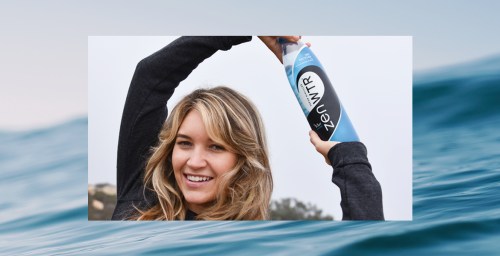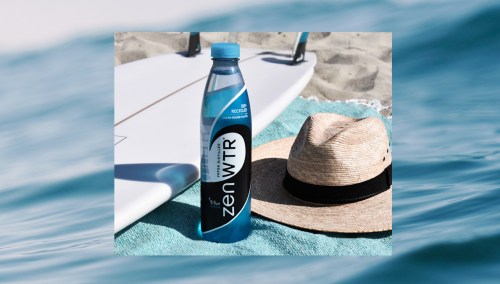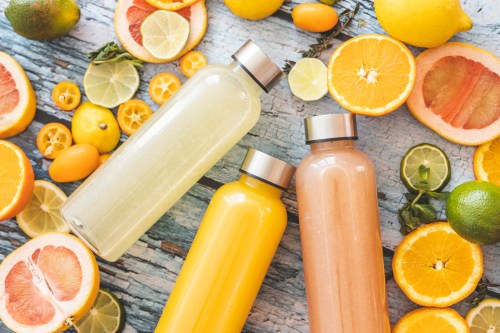Overhauling how you live your life in honor of Mother Earth is an amazing goal. But in reality, in order for a lifestyle to truly be sustainable (the planet kind), it’s got to be the other kind of sustainable (as in you’re able to maintain it), too.
Which is why starting with small doable changes is a smart idea, according to Lance Collins, founder of ZenWTR®. “Intention is one thing, but making a change is much harder,” Collins says. “We know that small changes are easier and less daunting for people to embrace, and we need people to embrace sustainable changes if we’re hoping to see real, lasting impact.”
That ethos is what led Collins to found ZenWTR alkaline water, the only beverage brand in the world with bottles made from 100 percent recycled, certified ocean-bound plastic. Not up to speed on plastic lingo? Ocean-bound plastic is plastic that is collected close to the ocean in areas that lack a formal recycling infrastructure, Collins says. TL;DR: It’s plastic at risk of ending up in the ocean, like, stat.
How does that relate to small changes you—an Earth-conscious reader—can make? Well, bottled water isn’t going anywhere—it was the top beverage category by volume in the U.S. in 2019, according to Beverage Industry. And because ZenWTR bottles are made out of up to five ocean-bound plastic bottles, simply opting for a different version of your body’s favorite beverage means you’re helping make a positive change for the planet. How’s that for a sustainable (squared) change?
Here’s how ZenWTR is putting ocean-bound plastic to good use.

Boosted benefits
Before taking a deeper dive into how ZenWTR helps the planet—aka, the reason why the brand is backed by fans like Anne Hathaway and Ellie Goulding—it’s worth pointing out that you get some additional benefits too.
A few of those: “You get a crisp, pure, great-tasting alkaline water, in a package that you are used to that has all the functionality that you know and love: it’s resealable and portable, fits in a cup holder, doesn’t affect the taste, and is priced at parity—and at the same time it helps prevent ocean pollution,” Collins says.
For the uninitiated, alkaline water has a higher pH—in ZenWTR’s case, 9.5—than regular drinking water, which means it’s less acidic. Studies have shown that drinking alkaline water may help hydrate you faster after a strenuous workout. Post-workout bev, coming right up.
Why it matters
Obviously, no one is pro plastic ending up in the ocean, but it can be hard to grasp all the negative effects it can have. Besides being incredibly dangerous for animals that ingest it or become entangled in it (and therefore endangering many species of fish, marine mammals, and sea turtles), it also affects our food chain, says Collins. “Increasing amounts of seafood caught for human consumption have been found to contain toxic microplastics,” he says.
Plus, one of the key reasons that ZenWTR reuses ocean-bound plastic is that the salt in the ocean degrades plastic, making it less viable for reuse as food-grade plastic (it’s safe for other items like home goods, building materials, and clothes).
“It’s estimated that nearly 70 percent of ocean pollution falls to the seafloor, meaning it’s unlikely to ever be recovered,” Collins adds. “The best way to address the issue of ocean pollution is to think upstream (pun intended!) and to rescue it before it hits the ocean.”
How it helps
It’s not just that the ZenWTR bottles are made from 100 percent recycled plastic, they’re also recyclable. “Our bottles, labels, and caps are 100 percent recyclable and we use special washable inks that make it easier to reuse the plastic in our labels for a wider variety of new items,” Collins says. “We also donate one percent of sales to ocean conservation and recycling education and advocacy.”
According to this report on the lifecycle of post-consumer recycled plastics, producing with recycled plastic reduces energy use by 84 percent and greenhouse gas emissions by 71 percent per pound, versus producing using new, unused plastic. There’s already enough plastic in the world, so by ZenWTR producing their bottles with recycled plastic that was ocean-bound, that creates a win-win.
“By creating a demand for this plastic, we are helping to build global recycling programs in areas where there was previously no incentive, or even any means, to recycle plastic,” he says. “This in turn also creates new recycling economies with opportunities for local bottle collectors to earn reliable income all while cleaning costal environments and increasing global recycling.” See? Small changes really do add up.
Photos: ZenWTR® Art: Well+Good Creative
Sign Up for Our Daily Newsletter
Get all the latest in wellness, trends, food, fitness, beauty, and more delivered right to your inbox.
Got it, you've been added to our email list.





